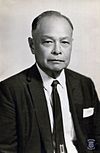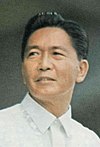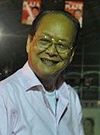Highest ranking-official of the Senate of the Philippines From Wikipedia, the free encyclopedia
The president of the Senate of the Philippines (Filipino: Pangulo ng Mataas na Kapulungan ng Pilipinas or Pangulo ng Senado ng Pilipinas), commonly referred to as the Senate president, is the presiding officer and the highest-ranking official of the Senate of the Philippines, and third highest and most powerful official in the government of the Philippines. They are elected by the entire body to be their leader. The Senate president is second in the line of succession to the presidency, behind only the vice president and ahead of the speaker of the House of Representatives.
This article has multiple issues. Please help improve it or discuss these issues on the talk page. (Learn how and when to remove these messages)
|
| President of the Senate of the Philippines | |
|---|---|
| Pangulo ng Mataas na Kapulungan ng Pilipinas | |
 | |
 | |
| Style | Mr. President (informal; within the Senate) The Honorable (formal) His Excellency (formal, diplomatic) |
| Member of | Senate of the Philippines National Security Council Commission on Appointments |
| Reports to | Senate of the Philippines |
| Seat | GSIS Building, Pasay |
| Appointer | The Senate |
| Term length | At the Senate's pleasure |
| Inaugural holder | Manuel L. Quezon |
| Formation | October 16, 1916 |
| Succession | Second |
| Website | Senate |
The current Senate president is Francis Escudero. He was elected on May 20, 2024.
The Senate president is elected by the majority of the members of the Senate from among themselves; Since there are 24 senators, 13 votes are needed to win the Senate presidency, including any vacant seats or senators not attending the session. Although Senate presidents are elected at the start of each Congress, there had been numerous instances of Senate coups in which a sitting Senate president is unseated in the middle of session. Term-sharing agreements among senators who are both eyeing the position of the Senate president also played a role in changing the leadership of the Senate, but in a smooth manner, the peaceful transition of power and this was done two times in 1999 and in 2006.
Unlike most Senate presidents that are the symbolic presiding officers of the upper house, the Senate president of the Philippines wields considerate power by influencing the legislative agenda and has the ability to vote not just in order to break ties, although the Senate president is traditionally the last senator to vote. A tied vote, therefore, means that the motion is lost, and that the Senate president cannot cast a tie-breaking vote since that would mean that the presiding officer would have had voted twice.
According to the Rule 3 of the Rules of the Senate, the Senate president has the powers and duties to:
The Senate president is also the ex officio chairman of the Commission on Appointments, a constitutional body within the Congress that has the sole power to confirm all appointments made by the president of the Philippines. Under Section 2 of Chapter 2 of the Rules of the Commission on Appointments, the powers and duties of the Senate president as its ex-officio chairman are as follows:
And if other impeachable officers other than the president such as the ombudsman is on an impeachment trial, the Senate president is the presiding officer and shall be the last to vote on the judgment on such cases according to the Senate Rules of Procedure in Impeachment Trials the Senate adopted on March 23, 2011.
In the Senate, he supervises the committees and attended its hearings and meetings if necessary and such committee reports are being submitted to his/her office.
All senators from 1941 onwards were elected at-large, with the whole Philippines as one constituency.
| No. | Portrait | Name (Birth–Death) |
Term of office | Party | Legislature | ||
|---|---|---|---|---|---|---|---|
| Took office | Left office | ||||||
| 1 |  |
Manuel L. Quezon[1] Member for the 5th Senatorial District (1878–1944) |
November 1916[2] |
November 15, 1935 |
Nacionalista | 4th Legislature | |
| 5th Legislature | |||||||
| Nacionalista Colectivista |
6th Legislature | ||||||
| Nacionalista | 7th Legislature | ||||||
| 8th Legislature | |||||||
| 9th Legislature | |||||||
| Nacionalista Democratico |
10th Legislature | ||||||
| – |  |
Sergio Osmeña[3] (1878–1961) Acting[a] |
1930 | 1930 | Nacionalista | 8th Legislature | |
| – |  |
José Clarín[4]: 260 (1879–1935) Acting[b] |
1932 | 1933[5] | Nacionalista | 9th Legislature | |
| |||||||
| 2 |  |
Manuel Roxas[7] (1892–1948) |
July 9, 1945 |
May 28, 1946 |
Liberal | 1st Commonwealth Congress | |
| 3 |  |
José Avelino (1890–1986) |
May 28, 1946 |
February 21, 1949 |
Liberal | 2nd Commonwealth Congress | |
| 1st Congress | |||||||
| 4 |  |
Mariano Jesús Cuenco (1888–1964) |
February 21, 1949 |
December 30, 1951 |
Liberal | ||
| 2nd Congress | |||||||
| 5 |  |
Quintín Paredes (1884–1973) |
March 5, 1952 |
April 17, 1952 |
Liberal | ||
| 6 |  |
Camilo Osías (1889–1976) |
April 17, 1952 |
April 30, 1952 |
Nacionalista | ||
| 7 |  |
Eulogio A. Rodriguez Sr. (1883–1964) |
April 30, 1952 |
April 17, 1953 |
Nacionalista | ||
| (6) |  |
Camilo Osías (1889–1976) |
April 17, 1953 |
May 20, 1953 |
Nacionalista | ||
| 8 |  |
José Zulueta (1889–1972) |
May 20, 1953 |
November 30, 1953 |
Liberal | ||
| (7) |  |
Eulogio A. Rodriguez Sr. (1883–1964) |
November 30, 1953 |
April 5, 1963 |
Nacionalista | ||
| 3rd Congress | |||||||
| 4th Congress | |||||||
| 5th Congress | |||||||
| 9 |  |
Ferdinand Marcos (1917–1989) |
April 5, 1963 |
December 30, 1965 |
Liberal (until 1965) | ||
| Nacionalista (from 1965) | |||||||
| 10 |  |
Arturo M. Tolentino (1910–2004) |
January 17, 1966 |
January 26, 1967 |
Nacionalista | 6th Congress | |
| 11 |  |
Gil Puyat (1907–1980) |
January 26, 1967 |
September 23, 1972 |
Nacionalista | ||
| 7th Congress | |||||||
| |||||||
| 12 |  |
Jovito R. Salonga (1920–2016) |
July 27, 1987 |
January 18, 1992 |
Liberal | 8th Congress | |
| 13 |  |
Neptali Gonzales (1923–2001) |
January 18, 1992 |
January 18, 1993 |
LDP | ||
| 9th Congress | |||||||
| 14 |  |
Edgardo Angara (1934–2018) |
January 18, 1993 |
August 28, 1995 |
LDP | ||
| 10th Congress | |||||||
| (13) |  |
Neptali Gonzales (1923–2001) |
August 29, 1995 |
October 10, 1996 |
LDP | ||
| 15 |  |
Ernesto Maceda (1935–2016) |
October 10, 1996 |
January 26, 1998 |
NPC | ||
| (13) |  |
Neptali Gonzales (1923–2001) |
January 26, 1998 |
June 30, 1998 |
LDP | ||
| 16 |  |
Marcelo Fernan (1927–1999) |
July 27, 1998 |
June 28, 1999 |
LDP | 11th Congress | |
| 17 |  |
Blas Ople (1927–2003) |
June 28, 1999 |
July 12, 2000 |
LAMMP | ||
| 18 |  |
Franklin Drilon (born 1945) |
July 12, 2000 |
November 13, 2000 |
Independent | ||
| 19 |  |
Aquilino Pimentel Jr. (1933–2019) |
November 13, 2000 |
June 30, 2001 |
PDP–Laban | ||
| (18) |  |
Franklin Drilon (born 1945) |
July 23, 2001 |
July 24, 2006 |
Independent (until 2003) |
12th Congress | |
| Liberal (from 2003) | |||||||
| 13th Congress | |||||||
| 20 |  |
Manny Villar (born 1949) |
July 24, 2006 |
November 17, 2008 |
Nacionalista | ||
| 14th Congress | |||||||
| 21 |  |
Juan Ponce Enrile (born 1924) |
November 17, 2008 |
June 5, 2013 |
PMP | ||
| 15th Congress | |||||||
| – |  |
Jinggoy Estrada (born 1963) Acting |
June 5, 2013 |
July 22, 2013 |
PMP | ||
| (18) |  |
Franklin Drilon (born 1945) |
July 22, 2013 |
June 30, 2016 |
Liberal | 16th Congress | |
| 22 |  |
Koko Pimentel (born 1964) |
July 25, 2016 |
May 21, 2018 |
PDP–Laban | 17th Congress | |
| 23 |  |
Tito Sotto (born 1948) |
May 21, 2018 |
June 30, 2022 |
NPC | ||
| 18th Congress | |||||||
| 24 |  |
Migz Zubiri (born 1969) |
July 25, 2022 |
May 20, 2024 |
Independent | 19th Congress | |
| 25 |  |
Francis Escudero (born 1969) |
May 20, 2024 |
Incumbent | NPC | ||

Seamless Wikipedia browsing. On steroids.